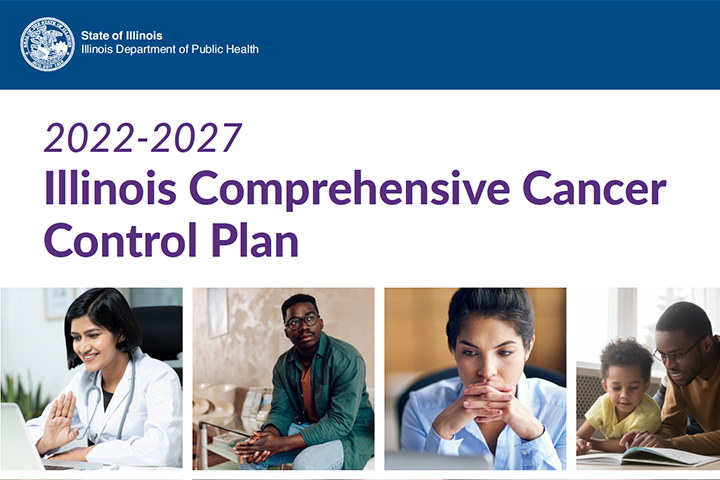
The 2022-2027 Illinois Comprehensive Cancer Control Plan incorporates a unique community engagement strategy that was developed by nearly a dozen University of Illinois Cancer Center members and staff.
The engagement team worked in partnership with Illinois Department of Public Health (IDPH) staff and other partners to propose, develop and implement the strategy over the course of 18 months. The Cancer Center workgroup leaders included member Keith Naylor, MD, Tamara Hamlish, PhD, and Nasima Mannan, MPH. Cancer Center member Leslie Carnahan, PhD, provided analysis and incorporated community perspectives into the narrative.
The primary goals of the comprehensive cancer control plan are:
Prevention
- Increase healthy living habits among youth and adults.
- Reduce exposure to environmental carcinogens.
- Prevent tobacco-related lung cancers among youth and adults.
- Prevent human papillomavirus (HPV)-related cancers.
- Promote awareness of hereditary cancers and use of genetic counseling.
Screening and early detection
- Increase cancer screening.
- Reduce late-stage cancer diagnosis.
- Reduce cancer mortality rates.
Diagnosis, treatment, and survivorship
- Promote awareness and access to navigation services, including financial navigation and care navigation to reduce disparities in cancer health outcomes.
- Increase diagnosis of high-risk patients with familial or genetic risk factors.
- Increase awareness of ongoing care coordination for monitoring, follow-up, and recurrence screening.
- Raise awareness of the need for increased quality of life for enhanced recovery and survivorship and available resources.
- Support the availability of telehealth and outreach programs.
Read the full Illinois Comprehensive Cancer Control Plan.
Building off the recommendations in the plan, the engagement policy committee and partners developed HR-0675, which was recommended to pass in the Illinois House of Representatives. The bill urges lawmakers to support and promote the 2022-2027 Illinois Comprehensive Cancer Control Plan for the benefit of residents across the state.
The American Cancer Society’s Cancer Action Network and stakeholders, including the Cancer Center, are actively advocating for the funding needed to implement the five-year plan.
